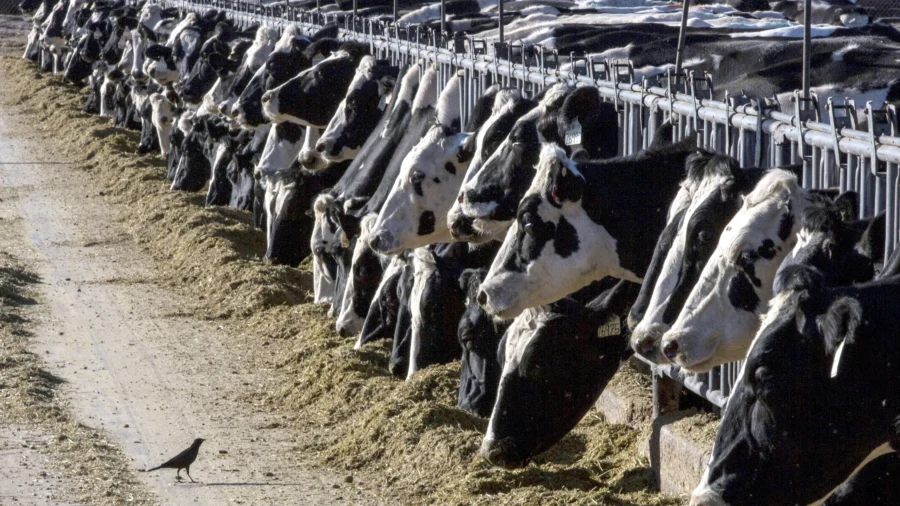Avian influenza has been detected in a person in the United States, officials said on April 1.
The person became ill after coming into contact with cows that are likely sick with the influenza, also known as the bird flu, the Texas Department of State Health Services said.
The Centers for Disease Control and Prevention (CDC) said that its testing confirmed the person has highly pathogenic avian influenza A(H5N1).
The first human case domestically was confirmed in Colorado in 2022. That man recovered after experiencing fatigue.
Worldwide, hundreds of cases, as well as hundreds of deaths, have been recorded since 2003, according to the World Health Organization.
“This infection does not change the H5N1 bird flu human health risk assessment for the U.S. general public, which CDC considers to be low,” the CDC said in a statement. “However, people with close or prolonged, unprotected exposures to infected birds or other animals (including livestock), or to environments contaminated by infected birds or other animals, are at greater risk of infection.”
The new patient’s main symptom was conjunctivitis, or eyeball inflammation, according to officials.
The CDC said over the weekend that people who are exposed to confirmed or probable cases should monitor themselves daily for 10 days and report any new respiratory symptoms or heightened temperatures. The incubation period is generally three to five days, but can last as long as 10 days, according to the agency.
The human case comes after cows in five states, including Texas, tested positive for the influenza.
Tests came back positive from New Mexico, Idaho, and Michigan, the Department of Agriculture said on Friday. Cows in Texas and Kansas previously tested positive for the illness, officials announced on March 25.
The cows in Idaho and Michigan came from Texas. The cattle did not appear sick when they were picked up from Texas and moved to Michigan, the Michigan Department of Agriculture and Rural Development said.
Federal and state officials have been investigating the cases, which have been found among mostly older cows exhibiting symptoms such as decreased milk production and a diminished appetite. The CDC and the Food and Drug Administration (FDA) are assisting.
Because the affected cows in Idaho came from another state that has identified influenza cases in cattle, the cases in Idaho may have been transmitted by cows, the Idaho State Department of Agriculture said.
The flu has been detected in birds before, and dead wild birds were found at farms that reported initial cases, the Department of Agriculture said. As of now, birds “are believed to be the source” of the infections, the agency said. But the spread of the illness among Michigan cattle, it said, indicates that transmission between cattle “cannot be ruled out.”
“The coincidence of timing is just too coincidental to say well, the shipment of cattle came up from an affected facility in Texas and then two weeks later we saw it in some other cattle,” Idaho state veterinarian Scott Leibsle told Politico. “That just doesn’t make any sense.”
Farmers are being encouraged to quickly report illnesses among their cattle to veterinarians, particularly if cattle experience symptoms associated with the influenza.
“As more is learned, it is vitally important for producers to work with their veterinarian and isolate sick animals from others, minimize the number of visitors to their farms, prevent contact between their animals and wildlife, and continue to vigilantly monitor the health of their animals,” Nora Wineland, Michigan’s state veterinarian, said in a statement.
Officials Say Milk Still Safe
The growing number of cases are not putting people at risk because milk bought commercially is pasteurized, officials said.
“Dairies are required to send only milk from healthy animals into processing for human consumption; milk from impacted animals is being diverted or destroyed so that it does not enter the human food supply. In addition, pasteurization has continually proven to inactivate bacteria and viruses, like influenza, in milk. Pasteurization is required for any milk entering interstate commerce for human consumption,” the Department of Agriculture said.
The FDA said the cases are a reminder that it can be harmful to ingest raw milk, which is favored by some people who say there are health benefits to drinking unpasteurized milk.
“This outbreak has quickly grabbed the attention of the agriculture industry on a national level. Understanding the details surrounding the transfer of avian virus to livestock is the top priority of animal health professionals and agriculture agencies. While troubling, this outbreak is not currently expected to threaten our nation’s commercial dairy supply,” Texas Agriculture Commissioner Sid Miller said in a statement.
The flu is affecting about 10 percent of each affected herd, there’s been “little to no associated mortality” so far, and the impact on the milk supply is limited, federal officials said.
“Milk loss resulting from symptomatic cattle to date is too limited to have a major impact on supply and there should be no impact on the price of milk or other dairy products. Further, the U.S. typically has a more than sufficient milk supply in the spring months due to seasonally higher production,” the Department of Agriculture said.
From The Epoch Times

